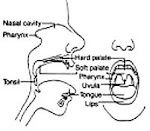For this blog I wanted to research Articulation Disorders. An articulation disorder involves mispronouncing speech sounds by omitting, distorting, substituting or adding sounds. These errors can make it difficult to understanding one’s speech.
The main message that I want people to get from this is that ANYONE can have a speech disorder. Whether a person stutters, or substitutes letters, a speech disorder of any type is a big deal. Thankfully, they can be overcome with the support and encouragement from those closest to the person with the speech disorder.
3 Things I hope readers will take away from this:
Children are expected to make developmental sound “errors” during the language acquisition process.
There is a difference between Articulation and Phonological Disorders. Articulation disorders occur when there is difficulty in producing speech sounds. Whereas Phonological disorders result from a difficulty in organizing speech sounds.
Articulation disorders can result from weak muscles, little control over the tongue or respiratory system, or a general immaturity relating to speech. In some cases (especially adults) it can be caused by hearing impairments, mental retardation, acquired brain injury and certain types of learning disabilities, as well as general speech delays.
Monday, December 7, 2009
Saturday, November 28, 2009
Monday, October 26, 2009
The difference between an articulation disorder and a phonological disorder
While doing research about Articulation Disorders, I began to see Phonological Disorders pop up and wondered what the difference was. The article I found focused on that very question. An articulation disorder occurs when a child (or adult) have trouble making individual speech sounds. A phonological disorder results from a difficulty in organizing speech sounds, this occurs at the cognitive level. Despite affecting different aspects of speech, it is possible for an individual to have both disorders.
Bowen, C. (2002). The difference between an articulation disorder and a phonological disorder. Retrieved from www.speech-language-therapy.com/phonetic_phonemic.htm on (Oct. 15). Referenced the Journal of Speech and Hearing Research, 36, 105-140.
Bowen, C. (2002). The difference between an articulation disorder and a phonological disorder. Retrieved from www.speech-language-therapy.com/phonetic_phonemic.htm on (Oct. 15). Referenced the Journal of Speech and Hearing Research, 36, 105-140.
Articulation
According to this website, it is normal for children to make some articulation errors. Although this is not a very long, detailed website it addresses main points concerning articulation disorders. It even gives Helpful Articulation Links, including Articulation Norms, Phonolgical Processes, Articulation Practice, and more Articulation Links. They provide additional information that the main website did not provide and practice sheets for various speech sounds a child might be working on in their speech.
http://hg016.k12.sd.us/articulation.htm
http://hg016.k12.sd.us/articulation.htm
Speech Disorder
Although this website also touches on what articulation disorders are and the common types and treatments, it provides different links not found on the previous website. These links give you the opportunity to ask experts questions, as well as a speech therapy link and everyday life for someone with a speech disorder.
http://www.speechdisorder.co.uk/Articulation-Disorders.html
http://www.speechdisorder.co.uk/Articulation-Disorders.html
American Speech-Language Hearing Association
This website does a good job at giving an overview about what Speech sound disorders are as well other commonly asked questions. These include whether adults can have speech sound disorders and if an accent is considered to be a disorder. It also gives the signs of disorders, both articulation and phonological, as well as how they are diagnosed and the treatments.
http://www.asha.org/public/speech/disorders/SpeechSoundDisorders.htm
http://www.asha.org/public/speech/disorders/SpeechSoundDisorders.htm
Subscribe to:
Posts (Atom)


